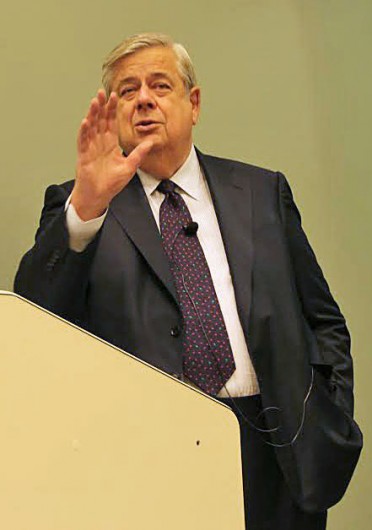
Robert Dilenschneider, who graduated from OSU in 1967 with a master’s degree in journalism, spoke to students at Hagerty Hall Feb. 19.
Credit: Thy Thy Nguyen / Lantern reporter
An Ohio State alumnus recommended college graduates find jobs they love, but more than that, ensure their employers appreciate them.
Robert Dilenschneider, who graduated from OSU in 1967 with a master’s degree in journalism, spoke to students Wednesday about what they should do to get into the professional world and what steps they can take to remain successful. He also gave them career advice tips from a recently published book he wrote titled “The Critical First Years of Your Professional Life.”
Dilenschneider is the president and principal of the Dilenschneider Group Inc., a corporate strategic counseling and public relations firm with offices in New York City and Chicago. He said graduates should look for jobs they find interesting, no matter the competition.
“Find something you really love. If you don’t love it, then don’t do it,” Dilenschneider told The Lantern before the lecture. “Don’t give up. It’s easy to become discouraged. It’s highly competitive. There may be three or five people who are trying to get the job that you’re trying to get. So, look for inventive and interesting things to say to your employer.”
There are several things people looking for jobs can say in order to impress a boss in an interview, Dilenschneider said.
“‘Hire me. I’m going to create value for you. I’m going to be a person that relates to your customers better than anyone else,’” Dilenschneider said.
He emphasized the importance of networking and social media.
“Networking is absolutely important. You have to add to it. By adding people to your network, it creates (career) opportunities for you,” Dilenschneider said. “You can’t exist without social media today in the U.S. People are interested in all forms of social media from Facebook to Twitter.”
Dilenschneider was the president and CEO of Hill and Knowlton Inc., a strategic communication firm, from 1986 to 1991 before forming the Dilenschneider Group in 1991.
He spoke to an audience of about 20 students in Hagerty Hall, focusing on the competitive job market. He said 10.2 million people were unemployed in January 2014.
“People are desperate out there looking for jobs,” Dilenschneider said in his lecture.
He gave tips about how to interact with a boss and coworkers in a professional environment, and said employees must learn to establish connections in other departments because that might help them land a promotion.
Dilenschneider said employees have to be energetic and motivated about their work and willing “to go the extra mile.”
“Don’t just kind of sit there passively when you have to be called. Show some energy. Show some life. Make your eyes come alive. Lean forward with your body. People like those small things,” Dilenschneider said. “Make sure that you’re constantly learning in the job. If you have a job and you’re not learning, that’s not good for you. Your time is the most valuable asset in your life. Make sure you put your time to work if you possibly can.”
Geoffrey Nugent, a third-year in Spanish and strategic communication who attended the lecture, said he enjoyed the speech.
“I think it was an absolutely brilliant presentation. It’s a true privilege to hear advice from such an accomplished man and (an) OSU alumnus,” Nugent said.
Morgan Johnson, a first-year in public affairs who attended the lecture, said the speech was educational.
“I thought that it was really informative because Mr. Dilenschneider shared a lot of pertinent information about my professional future. It was really assuring to hear about his confidence in OSU students getting jobs in the future,” Johnson said.
Dilenschneider emphasized in his lecture that students need to make sure they learn from their mistakes.
“You’re going to make mistakes in the job that you’re in. I guarantee it. I make mistakes every day. But make sure that nobody jumps down your throat when you make a mistake. Make sure that you learn when you make mistakes. Make sure that your boss says, ‘Well, mistakes were made. But how do we move forward?’” Dilenschneider said. “Make sure that the organization that you work for values your work. If they (the company or organization) don’t value your work, it’s not really a worthwhile thing to do.”


